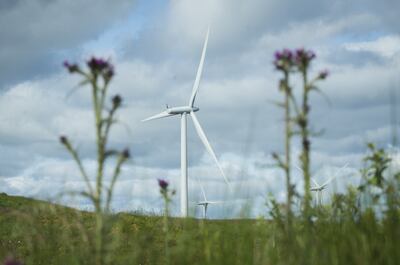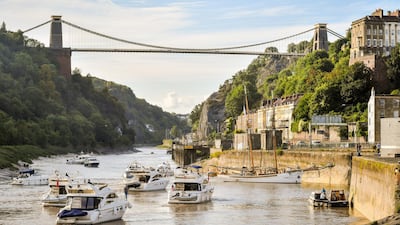In the UK, on the Bristol side of the Clifton Suspension Bridge, there is a plaque marking the design of this incredible structure by 25-year-old Isambard Kingdom Brunel.
At the time, in 1831, the bridge across the Avon Gorge, at 202 metres in length and 76m above the River Avon, had the longest span of any bridge in the world. Even today, it still represents a feat of remarkable design and construction.
For that, of course, we must thank Brunel, a brilliant civil engineer and visionary, recognised as one of the greatest figures of the Industrial Revolution. His dockyards, railway lines, steamships, tunnels and bridges transformed public transport and engineering. His ideas also revolutionised the British economy and when they were exported, the fortunes of other nations.
I happened to be visiting Clifton, to see family, in October last year, when Boris Johnson’s government published Net Zero Strategy – Building Back Greener. It’s easy to be critical of Mr Johnson and his relentless boosterism. Often, it seems as if his sweeping optimism is a mask for a paucity of thought and detail, an excuse for yet another photo opportunity and more showboating.
As prime minister, he has frequently paid tribute to our Victorian forbears, to the likes of Brunel. He is fond of saying that we need to resurrect that boldness and courage again, that they showed what is achievable. They did not always get it right either – Brunel made mistakes, not all his projects were successful – but they were prepared to try, and to try again. In Brunel, people were ready to back someone so young and unproven.
It’s clear that Mr Johnson is correct, that something similar must occur again if we are to have any prospect of securing a sustainable society, one that adapt to the demands of climate change while continuing to develop and prosper.
The problem is that at present all we have are words, empty rhetoric, when what we are crying out for is a 21st-century breed of Brunels to pave the way. Worse, in the absence of action, we’re in danger of heading towards an impasse where precious time is wasted, while nothing is implemented.
The warning signs are there. In the UK, some of those on the right of the Conservative Party are seizing on net zero as their next battleground after Brexit, another example of state intervention they feel we can do without. Except, this being about the very future of the human race, and not the EU, we can’t.
Cop26 was not a blazing triumph, nor was it a failure. The aim, widely agreed among nations, of restricting global warming to 1.5°C this century, by reaching net zero by 2050, is still to play for. But that requires leadership and focus and determination. None of which are in abundance.
Instead, in the UK at least, we’re getting distracted. We’re grappling with leaping energy prices, in petrol, gas and electricity. Dealing with the short-term threatens to obscure what we should really be attending to, which is the long-term and the requisite shift away from fossil fuels.
Such is the chaotic nature of the transition that those with interests vested in oil, gas and coal are able to argue forcibly for a slowing-down, that we simply do not possess the means to meet our targets, certainly not one of 1.5°C.
Following the Paris Agreement of 2015, which saw 197 countries – among them UAE as the first Gulf state – set a target of 1.5°C, the baton passed to Britain as host of the next round of climate talks. In the build-up to Cop26, Mr Johnson did step up, heading a semblance of a cavalry charge with a flurry of announcements and initiatives. Stirring as it was, to see a modern version of another dashing blond, General Custer, taking to the saddle once more, the bravado was again not matched by results.
Last year, says Carbon Brief, the UK burned more fossil fuel than clean. Despite wind turbines popping up seemingly everywhere, the contribution from that quarter fell by 15 per cent – the product of lighter winds, possibly themselves the outcome of warmer temperatures. Nuclear was also down by 10 per cent, the legacy of having tired, elderly reactors.

The government created a green homes grant scheme to encourage the installation of more energy-efficient heat pumps in people’s houses. Under the Net Zero Strategy, new gas boilers are to be outlawed by 2035. The goal was 600,000 households to be converted; the tally was a mere 47,500. Likewise, what was billed as a creator of jobs also failed to deliver.
This is so bad as to be embarrassing – and unfortunately, along with other steps such as the ending of the sale of new diesel and petrol cars by 2030, while electric vehicles remain obdurately expensive and charge points are in short supply, play directly into the hands of the critics.
The Climate Change Committee, which advises the UK government, last month pointed to farming, which accounts for 10 per cent of all UK emissions as a gaping hole for decarbonisation. We eat too much meat and dairy, and not enough plant-based foods. But if he is to set us on the path to net zero, Mr Johnson, is going to have to come up with a robust plan for agriculture. Again, his imploring us to abandon steak is manna for his opponents. A prime minister known to love late-night raids on the fridge for his cheese telling us to abandon the stuff? Fantastic.
Likewise, there is no firm policy for reducing flying or for introducing cleaner aviation. Traffic has declined, thanks to the pandemic, but once that is ended, will climb again.
The UK tax system ought to be overhauled to reflect the push for net zero, fossil fuel subsides must end, imports and exports should be subjected to more stringent green standards, a carbon tax should be levied on imports, overseas aid should be restored to its former 0.7 per cent of GDP level to help fund developing countries and to persuade them to become more eco-centric. These, and more, are recommendations from the Climate Change Committee.

The trouble is that every single one of them will provoke a row and promote further attacks from the Tory right. Britain still chairs Cop26 – it does not stand down until Egypt grasps the mantle when Cop27 opens at Sharm El Sheikh in November. So, we’re in a curious position, led by a general who is damaged if he does and damaged if he doesn’t. Having lost authority in recent weeks and reliant upon Labour to vote through his policies, Mr Johnson is fearful of dictating and poking his own party. At the same time, his administration ought to be leading the world by example.
To be fair, other country heads are struggling to impose themselves where net zero is concerned. Nevertheless, as John Gummer, chair of the Climate Change Committee says, this year “is critical for climate action in the UK and internationally. At home, we need to walk the talk and urgently deliver actions in the net-zero strategy.
"Globally, the UK must continue to encourage stronger action on climate and insist on rapid emissions reductions and stronger adaptation through all diplomatic channels. The ultimate success of the Glasgow climate pact will be measured in climate risks averted, not words on a page.”
This is where Brunel comes in. Rather than bang on ad infinitum about numbers and targets, Mr Johnson should be spearheading a revolution. One of his other, great planks of ideology – the one that brought him victory – was “levelling up”. He has the opportunity to turn Britain into the “go to” renewables supplier, the producer of equipment and technology for net zero energy.
Over the past decades, Britain has moved to be a service economy, but there is not enough to service, not so that those in the post-industrial North and Midlands can be properly employed. Note “post-industrial”. Make it “industrial” again, redevelop manufacturing and engineering but now as the maker of generating machinery for wind, solar, hydro, geothermal, ethanol. One example: the tides along the west coast, from the Solway Firth to the Severn Estuary, if properly harnessed, could supply 20 per cent of the UK’s entire electricity needs. That and other schemes, you just know, are what someone such as Brunel would be doing today.
Where net zero is concerned, Britain must, as Gummer says, “walk the talk”. Wanted: a new Brunel to show us how.


